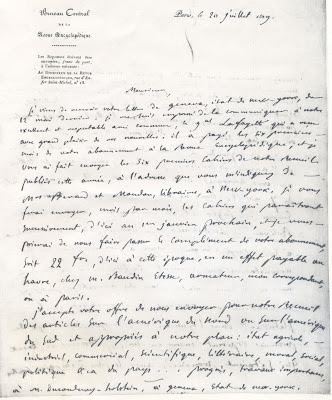What will
your grandchildren be able to find out from the historic records you leave
behind? I am often asked why I don’t have images of or information on a certain
home, building, event, or person in the Historical Society Archives and I tell
the questioner it is because no one shared a photo or research material with
us. Most of our collection is made up of
items and information donated to the historical society.
Many people
think photographs and manuscripts from 20, 30 or 40 years ago are too recent to
be of interest to historians, but these items are already historic. How many people remember businesses like
“Cool Beans” located in the Dove Block during the early 2000s or Mario’s located
on Hamilton Street Geneva
 |
Example of a letter from
our collection dated 1829.
Will there be any documents to tell your story
in 184 years?
How many examples of handwriting will
actually
survive 100 years
from now?
This is a problem and will become a larger problem as time goes on. In the age of information, people may not save photographs in the same format, may not write letters, may have manuscripts saved in the “cloud”. There are wonderful new space saving, easy access forms in which to store information, but will your children think to look on your computer and transfer your image files to their computer? Or, if you saved electronic communications, will your grandchildren find your e-mails to their parents as detailed and interesting as the letter you would have written 20 years ago? Do you keep journals or diaries on your laptop? Will your unprinted manuscript ever get printed? Will your nieces and nephews find the images of the old family homestead that you linked to Ancestry.com? Perhaps, but what happens to the history of your family, the first family home, or the business your grandfather started if they don’t think to look at your electronic records?
I don’t bring
these questions up because I want folks to flock in here with all their records
(though I wouldn’t mind that), but because I would like to remind everyone that
history is fragile. No museum or
historical society has the staff to continually go out into their city and
record every change that happens each year; we rely on our members and the
public to help us preserve the story of our area. If your history, which is entwined with the
place you live, is created and preserved on a computer will your heirs think
about contributing this information to the local historical society or just
wipe the hard drive clean?
 |
| A photograph of Hugh Dobbin
who died in 1855. Will there be a photograph of you for your relatives to see in 158 years? |
I have a few
suggestions that may help you ensure the future of your past. If you save your photographs electronically
back them up on a flash drive, or external hard drive. Also make sure you label each photo and each
file so people looking at them know who is in the picture, when and where it
was taken. The quickest way to insure
photos will not be saved by future generations is to leave a collection of
images with no identification. There
will come a time when no one remembers who the people are and the images lose
their historic value.
The
historical records you leave behind for your family allow you to tell your
story to them long after you are gone.
The words and images you preserve for them will bring You to life
for generations to come. A little
careful planning on your part can help you ensure your personal history is
accessible and preserved for your family.
If you want help or suggestions on record preservation just contact the
archivist or curator at your local historical society and discuss it with them. The steps you take today save history for
tomorrow.
 |
Volunteer, Jane Donegan, working on Warren Hunting
Smith's papers,
a collection consisting of over 30 boxes of material.
|
No comments:
Post a Comment